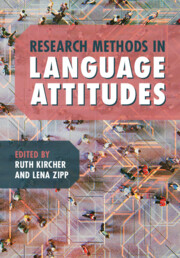Book contents
- Research Methods in Language Attitudes
- Research Methods in Language Attitudes
- Copyright page
- Contents
- Figures
- Tables
- Contributors
- Foreword
- Acknowledgements
- 1 An Introduction to Language Attitudes Research
- Part 1 Analysis of the Societal Treatment of Language
- Part 2 Direct Methods of Attitude Elicitation
- Part 3 Indirect Methods of Attitude Elicitation
- Part 4 Overarching Issues in Language Attitudes Research
- 17 Researching Language Attitudes in Multilingual Communities
- 18 Researching Language Attitudes in Signing Communities
- 19 Researching Language Attitudes Based on Historical Data
- 20 The Use of Priming in Language Attitudes Research
- 21 Mixed-Methods Approaches to the Study of Language Attitudes
- References
- Index
- References
21 - Mixed-Methods Approaches to the Study of Language Attitudes
from Part 4 - Overarching Issues in Language Attitudes Research
Published online by Cambridge University Press: 25 June 2022
- Research Methods in Language Attitudes
- Research Methods in Language Attitudes
- Copyright page
- Contents
- Figures
- Tables
- Contributors
- Foreword
- Acknowledgements
- 1 An Introduction to Language Attitudes Research
- Part 1 Analysis of the Societal Treatment of Language
- Part 2 Direct Methods of Attitude Elicitation
- Part 3 Indirect Methods of Attitude Elicitation
- Part 4 Overarching Issues in Language Attitudes Research
- 17 Researching Language Attitudes in Multilingual Communities
- 18 Researching Language Attitudes in Signing Communities
- 19 Researching Language Attitudes Based on Historical Data
- 20 The Use of Priming in Language Attitudes Research
- 21 Mixed-Methods Approaches to the Study of Language Attitudes
- References
- Index
- References
Summary
This chapter examines what research falls under the epithet of ‘mixed-methods’ and discusses the main advantages of conducting mixed-methods research. The chapter introduces the key issues of mixed-methods research planning and design: that is, the tackling of ontological and epistemological challenges, the equal weighting of methods, and the sequencing of methods. The chapter also provides information regarding the analysis of data resulting from mixed-methods research, and how this can be done in a manner that provides appropriate integration. The key issues of the chapter are illustrated by means of two case studies. The first investigates attitudes towards French and English in Montreal, making use of a questionnaire and a matched-guise experiment. This case study shows how mixed-methods approaches can lead to a deeper understanding of language attitudes as part of larger social processes in a manner that no one method on its own could do. The second case study examines attitudes towards Catalan in Northern Catalonia by means of interviews and variable analysis. This case study demonstrates how mixed-methods research allows for a broader representation of the attitudinal and ideological landscape of a specific language community than could be afforded by the use of one method alone.
Keywords
- Type
- Chapter
- Information
- Research Methods in Language Attitudes , pp. 330 - 345Publisher: Cambridge University PressPrint publication year: 2022
References
Suggested further readings
- 2
- Cited by



